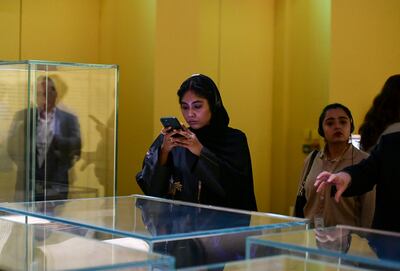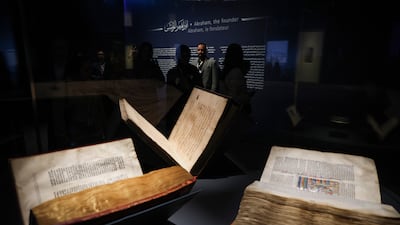Throughout much of history, book burning has been reviled as a transgressive, nihilistic act of wilful ignorance. When the books being burned or otherwise desecrated are holy texts, even those without a religious faith can appreciate the hurt and insult it causes to millions of believers.
Sadly, we have seen several such abhorrent acts in recent months, particularly in Europe where marginal provocateurs have burned copies of the Quran in so-called protests that are devoid of any substantive point.
It is heartening, therefore, to witness the opening this week of a new exhibition at Louvre Abu Dhabi that displays, explores and celebrates a range of holy texts – an exercise in cultural and intellectual curiosity that stands in stark contrast to the narrow and deluded ambitions of the book burners.
Running until January 14 next year, Letters of Light, curated by Laurent Hericher, head of the Oriental manuscripts department at the Bibliotheque nationale de France, along with Souraya Noujaim, director of the Islamic Arts department at the Musee du Louvre, examines the historical conditions in which holy books developed.

With more than 240 artefacts on display, Letters of Light contains striking examples of the Quran, Bible and Torah, showing how their production techniques changed over the centuries, reflecting the technological and artistic sensibilities of their time. Among these are: a copy of the famous Gutenberg Bible, the earliest book printed using moveable type; fragments of famous Dead Sea Scrolls; and a 16th-century Quran from Egypt, open on the page of Surah al An'am, describing the Abraham’s path to monotheism. There is also a 14th-century Torah parchment that depicts the sacrifice of Isaac and the exhibition also includes many supporting artworks, such as etchings by Rembrandt that portray scenes from Abraham’s life.
It is a serious and scholarly exploration not only of the three faiths that have their origins in the Middle East but of the book as a tool of human knowledge and communication.
When taken with comparable projects in the UAE – such as the excavation and preservation of ancient Christian monasteries in Abu Dhabi and Umm Al Quwain, or the Abrahamic Family House on Saadiyat Island – it is clear that any novelty value once attached to the idea of a Muslim nation valuing important heritage from the Christian and Jewish traditions is long gone.
Instead, there is an appreciation and tolerance of diversity that is rooted in credible research and academic exploration. That this new collection is on display in a public forum for such as Louvre Abu Dhabi also reveals a commitment to making this knowledge and culture accessible to as many people as possible.
The juxtaposition with book-burning extremists could hardly be greater. Radicals seek to silo people into different categories and to then set them in opposition against one another. Serious historians and curators explore different traditions but can appreciate the ties that bind them together. Every visit to Letters of Light is a riposte to those who, unable to learn anything from holy books, can only burn them instead.


